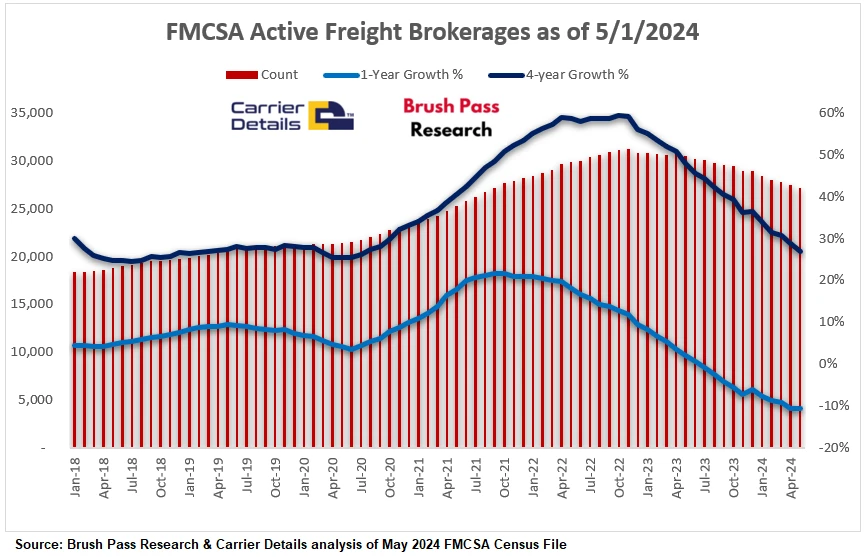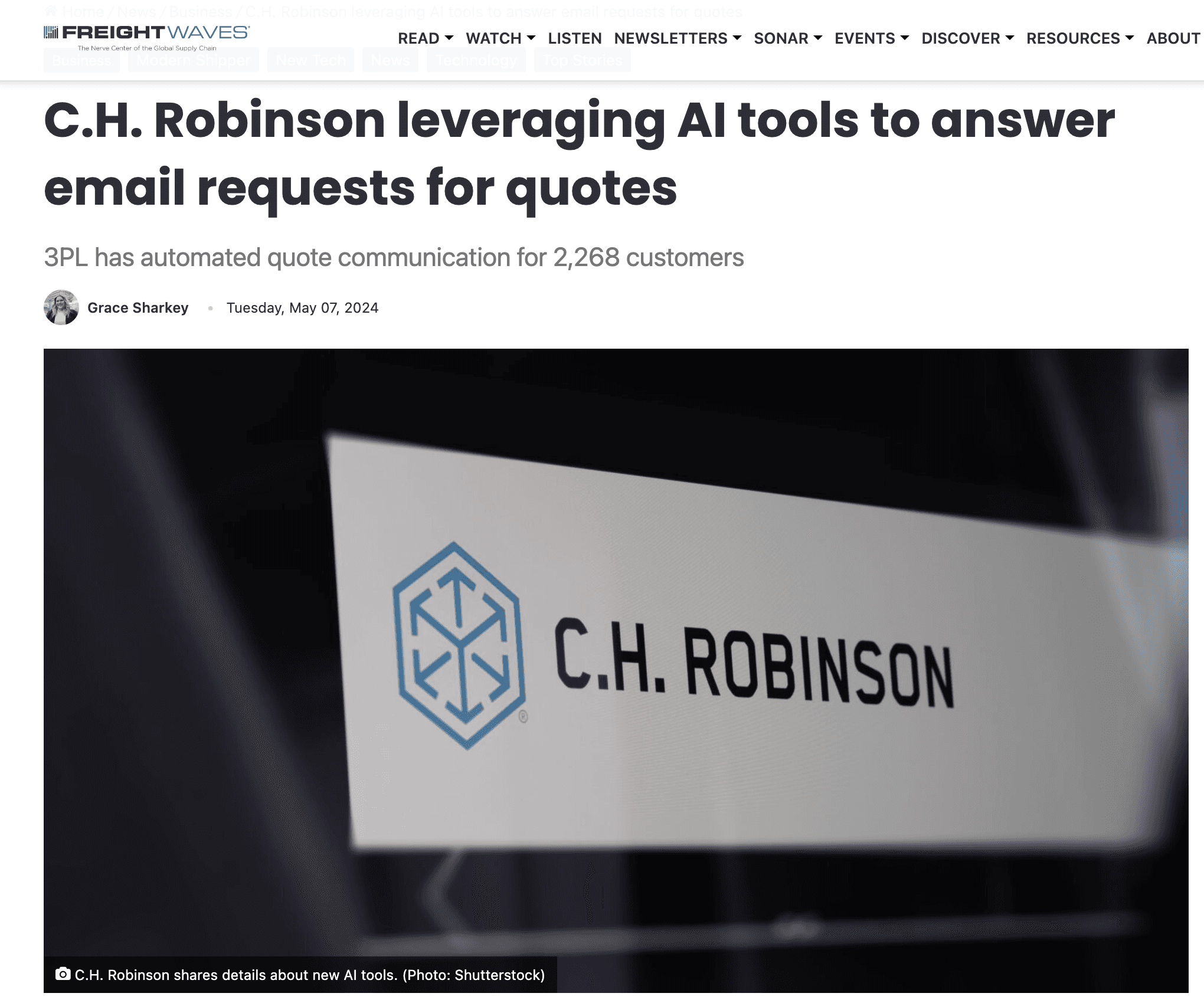Outsmarting the Giants: AI in Freight Brokerage

Thilo Huellmann
Sep 30, 2024
In the grind of freight brokerage, you’re hustling, juggling calls, closing deals, and maybe squeezing in a weekend barbecue. But with industry giants like C.H. Robinson and others, how can smaller freight brokerages ensure they survive and remain competitive in today’s market? Have you taken time to strategize how you’ll carve out your piece of the pie and don’t get squeezed out?
The Current State of the Freight Brokerage Industry
The freight market has been crazy lately, and brokerages are facing churn just as carriers are. At the height of the carrier gold rush in September 2022, brokerages reached a peak population of 31,225, according to Brush Pass Research and FMCSA data. However, by July 2023, the number of broker authorities fell to 27,450. That’s a 12% decrease.
Brokerage revenues also took a hit, declining by 15.1% in 2023. Margins have been squeezed as well. This compression impacts commissions, cash flow, and budgets, making it challenging to invest in new technologies that can bring a competitive edge.
As of May 2024, there are now 27,206 active freight brokerages.
The year-over-year closure rate has slightly accelerated up to -10.8% from -10.6% the previous month.
Still, there are 27% more active brokerages compared to four years ago.
That means the market still has some more shrinking to do. So how are you going to make sure you stick around?

The New Frontier in Freight Logistics
C.H. Robinson, one of the largest U.S. freight brokerages, recently announced its industry-changing technology that automates email transactions. This will usher in a seismic shift in how logistics can be managed. Using AI, their system can read, classify, and respond to incoming emails almost instantly.
Mark Albrecht, Vice President for Artificial Intelligence, explained, "Now, our new technology reads the email and supplies the quote in an average 2 minutes 13 seconds. C.H. Robinson is doing this at scale, leaving our people more time to help those same customers with more complex requests."
Why You Should Care:
C.H. Robinson receives over 11,000 emails per day asking for pricing on truckload freight.
Automation enables them to handle 2,000 customer quote requests per day– without breaking a sweat.
Benefits: Time and cost savings, rapid communication, improved relationships

The Cost of Cutting-Edge Tech
Sure, all this sounds great, but what does it take to implement such technology? Well, a lot. C.H. Robinson has a robust tech team, including data engineers, machine learning engineers, and software developers, with salaries ranging from $116K to $160K. They’ve got a sophisticated infrastructure that many smaller brokerages simply can’t afford.
Data Engineer: $116K - $160K
Software Engineer: $112K - $162K
Machine Learning Engineer: Similar high-range salaries
For smaller brokerages, matching this level of investment is nearly impossible. Giants like C.H. Robinson and J.B. Hunt have the resources to become tech companies, but for most, it’s just not feasible.
AI in Freight Brokerage: The New Gamechanger

AI and automation are becoming the new battleground in the freight industry. Here's how AI is being utilized:
Automated Email Handling and Data Extraction
AI reads, classifies, and extracts details from emails, populating data directly into the broker's TMS. This eliminates manual data entry and speeds up processes.
Automated Quote Generation
AI can automatically generate and respond with price quotes in minutes. At C.H. Robinson, their AI system handles over 2,000 automated truckload quote emails per day.
Intelligent Email Triage and Routing
AI algorithms prioritize, categorize, and route emails to the right teams, ensuring timely responses and streamlined workflows.
Answering track & trace requests
AI identifies incoming emails as track & trace request, extracts the load information and pings the TMS for the latest update on the shipment. Once the context is gathered the request can be answered automatically.
AI-Powered Sales Automation
AI chatbots and virtual assistants automate outbound sales processes, from cold calling to lead nurturing, enabling personalized email campaigns at scale.
And plenty of other uses. If you aren’t on these tech trends by now, you’re already behind.
The Realities for Smaller Brokerages
Smaller brokerages face a tough reality: they need to innovate to stay competitive but lack the massive tech budgets of their larger counterparts. As John Mahle, Senior Sales Executive at Triple T Transport, puts it, “Five to seven thousand additional brokers have come into the market in the past five years, representing a fifty percent increase.” This influx has intensified competition, making it crucial for brokers to find ways to cut costs and increase efficiency.
Leveraging AI Without Breaking the Bank
This is where smaller brokers can get creative. By partnering with companies that offer AI-driven solutions, they can access cutting-edge technology without massive investments. To up your brokerage’s business and bring you closer to what C.H. Robinson is doing, here’s what you need to know.
Machine Learning and Natural Language Processing (NLP)
You need a company that leverages machine learning and NLP to streamline email workflows for freight brokers.
Email Classification and Handling: AI models classify incoming emails into categories like quote requests, load tenders, or shipment tracking updates. This classification is powered by machine learning models trained on vast amounts of email data to recognize patterns and intents.
Data Extraction: Once an email is classified, NLP capabilities extract critical details from the text or attachments, such as shipment details, pricing information, or delivery schedules, which are then automatically populated into the broker’s Transportation Management System (TMS).
Automated Responses and Workflows: The system can generate automated responses based on predefined templates and the extracted data, helping to swiftly respond to common queries and reducing the manual effort involved.
Let’s take at the logistics software company Project Apollo.
Challenge: Apollo struggled to adapt to the rapidly changing market conditions and increasing shipper demands. They were bogged down by traditional quoting and tendering methods that ate up a lot of time and mental attention. They couldn’t keep up with such high volumes of emails.
Solution: They partnered with Levity.ai, integrating the program with Apollo’s shared email inboxes, rating engine, and TMS to achieve automated freight tendering and quote handling. This included categorizing incoming emails, extracting load details, and pushing the carrier responses back to the TMS.
Results: With Levity’s automation, Project Apollo saved hundreds of hours per month, allowing staff to focus on building relationships and expanding digital spot freight coverage.
"Levity does the human tasks that humans don't want to actually do. It gets humans out from the inbox and focusing on the business." — Ken Apple, Co-Founder, Project Apollo
The Levity.ai Advantage
This is where smaller and mid-sized brokerages can get creative. By partnering with a company like Levity that offers AI-driven solutions, they can access cutting-edge technology without massive investments.
Additionally, close technology partnerships with complementary freight tech companies like Bitfreighter, Greenscreens, TextLocate, and Front play a crucial role in elevating a brokerage's operations. Combining Levity with these tools creates a synergistic effect, amplifying efficiency and effectiveness.
Levity.ai specializes in automating email workflows, making it accessible for smaller brokers to compete with the big guys. By automating email and transaction-related tasks, Levity.ai can help brokers increase operational speed, reduce costs, and improve response times—ultimately boosting competitiveness in a crowded market.
So if you’re ready to stop drowning in emails and start focusing on what really matters book a demo with us.

